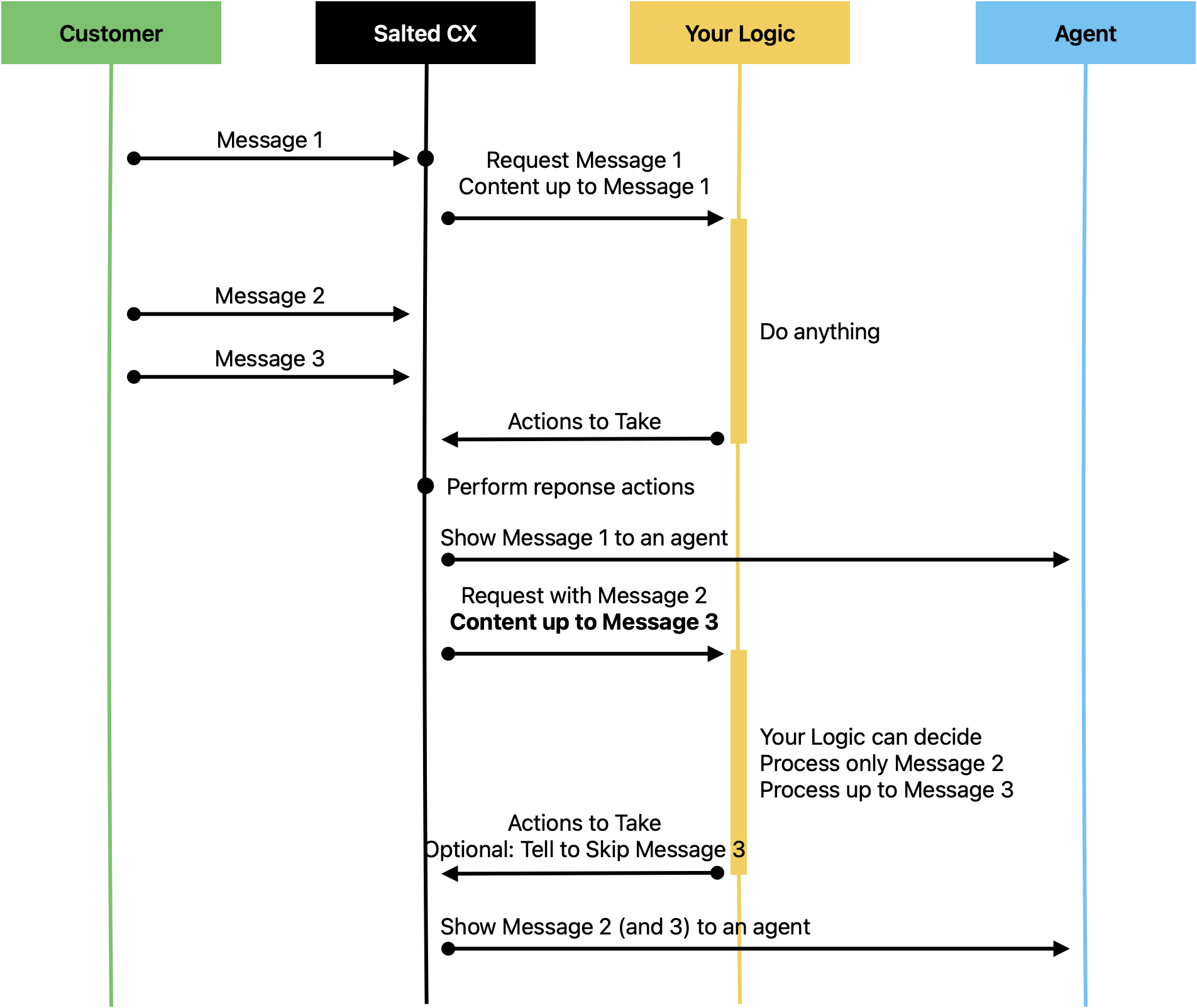During conversations, participants do not have to always wait for each other. For example, while the agent is typing a message, the customer can provide additional context, ask more questions, encourage the agent to respond faster, etc. The same may happen for Your Logic no matter how fast it is.
Salted CX tries to reduce complexity for Your Logic while giving you control over how you process individual events in the conversations.
Receiving Events from Salted CX
Every action that is worth processing can be intercepted by Your Logic. Because Your Logic may perform time-consuming operations, the participants may send more messages (or perform other actions) before Your Logic manages to respond to the first message.
This asynchronous communication is very similar to how people communicate. When somebody texts you a question, you are composing a message to clarify the question, but just as you send your message, another text arrives. This can make your reply irrelevant. These things happen and are natural. It is important that Your Logic is ready for it.

The flow above would produce 2 or 3 requests to Your Logic, depending on how you handle them. Notice that while Your Logic is busy responding to the first message, the customer sends two more messages. The example could be something like this:
Hello
I would like to rebook the trip to sometime next week
I was thinking about Thursday or Friday.
Request versus Current State
Salted CX sequences the incoming messages (and all other actions) in each conversation, so you receive all individual requests for each event that happens unless you tell Salted CX you do not want to get them.
| Property | Description |
|---|---|
| Request Time | Time when the request is sent to Your Logic. Salted CX sends you complete state of the current conversation as of this time including turns and other changes following the trigger that caused this. Your Logic is free to process these “future” updates as a response to this request or wait for a request in the future. |
| Expiration Time | Time until when Your Logic has time to respond. After this time expires Salted CX behaves as if Your Logic was not available. It also unblocks a next request in the queue. |
| Trigger Time | Time when the trigger causing this request actually happened. This is either the same time as request time or typically a bit earlier due to delay caused by processing the original event and even waiting for processing of previous events and Your Logic. Trigger time is specifically the end of post processing. |
Importantly Salted CX sends you the current state of the conversation even when it contains messages and other events that happen after this request. You can choose to process them or not.
Salted CX follows these simple rules:
- Sends one request for every message or other event unless you tell us not to do that
- Sends the state of the conversation at the time when the request is sent
Request 1
Request 1 is simple. It sends only one message and the conversation contains only one message.
{
"request": "5a1bfe8d-c73f-4af7-80db-3f6400a10f2d",
"time": "2025-04-13T08:00:01Z",
"expires": "2025-04-13T08:00:16Z",
"trigger": {
"time": "2025-04-13T08:00:00Z",
"type": "Message",
"participantType": "Customer",
"content": "Message 1 content"
},
"customer": {
/* customer attributes */
},
"conversation": {
/* convesation attributes */
},
"engagements": [
/* list of engagements */
],
"turns": [
{
"pid": "88b4b430-7f0b-4e15-90a5-3d2e287dfa71"
"time": "2025-04-13T08:00:00Z"
"type": "Message",
"participantType": "Customer"
"content": "Message 1 content"
}
]
}Response 1
We show an example empty response that tells Salted CX just to cary on and continue sending subsequent requests for that conversation.
{
"request": "5a1bfe8d-c73f-4af7-80db-3f6400a10f2d"
}Request 2
Request 2 is interesting because while processing Request 1 in Your Logic the customer sent two more messages. Notice in the subsequent code example that despite the trigger is the Message 2 from he customer the turns array contains also the Message 3.
{
"request": "a3bb189e-8bf9-3888-9912-ace4e6543002",
"time": "2025-04-13T08:00:16Z",
"expires": "2025-04-13T08:00:31Z",
"trigger": {
"time": "2025-04-13T08:00:10Z",
"type": "Message",
"participantType": "Customer",
"content": "Message 2 content"
},
"customer": {
/* customer attributes */
},
"conversation": {
/* convesation attributes */
},
"engagements": [
/* list of engagements */
],
"turns": [
{
"pid": "88b4b430-7f0b-4e15-90a5-3d2e287dfa71"
"time": "2025-04-13T08:00:00Z"
"type": "Message",
"participantType": "Customer"
"content": "Message 1 content"
},
{
"pid": "b8d4c4e0-8e3d-4ff6-a3e3-681b4b9d570e"
"time": "2025-04-13T08:00:10Z"
"type": "Message",
"participantType": "Customer"
"content": "Message 2 content"
},
{
"pid": "2d4e36b2-0c4d-4d75-b25f-4b6c56e3c25e"
"time": "2025-04-13T08:00:15Z"
"type": "Message",
"participantType": "Customer"
"content": "Message 3 content"
}
]
}Response 2
There are two ways how Your Logic can respond. The first option is the same as Response 1. Just returning the request PID. This would lead to Salted CX sending a third request with content of the message 3.
{
"request": "a3bb189e-8bf9-3888-9912-ace4e6543002"
}However Your Logic can also process all turns including the “future” turns and tell Salted CX not to send requests for those. When you respond with skipAfter property all events that happened up to that time will not produce any requests to Your Logic. Typically this would be the time of the last turn in the request.
{
"request": "a3bb189e-8bf9-3888-9912-ace4e6543002",
"skipAfter": "2025-04-13T08:00:15Z"
}Parallel Events
In case Your Logic implementation is able to process multiple events in parallel, you can enable this behavior by changing how Your Logic responds to events:
- Return response with no actions immediatelly after receiving the event (this enables Salted CX send you a next event immediatelly)
- Once you have the response to the event update the conversation directly without tying it to a specific event
You can freely combine this with sequencing. For example, if you receive an event you are able to process in parallel with another event, you can handle it differently from an event you do not want to handle in parallel.